Buy the Award-Winning Book Here!!!!
Read the Introduction Chapter: What’s Racism Got To Do With It? Black Women & Girls, Sexual Abuse, & Liberation
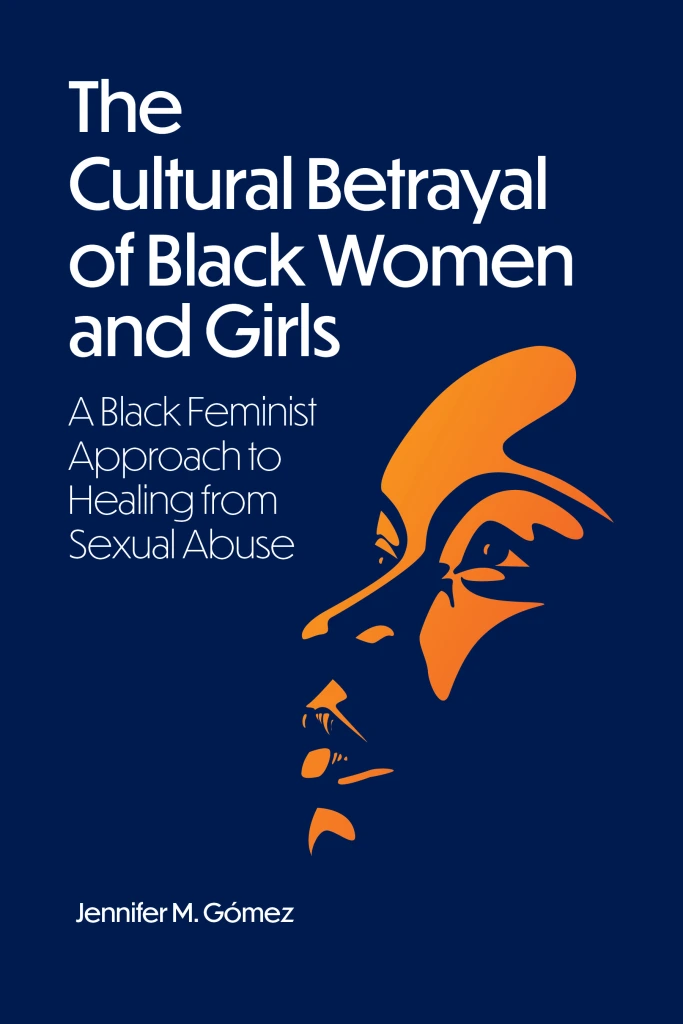
USA Today
Interviewed for Kenny Jacoby’s article, Michigan State football coach Mel Tucker accused of sexually harassing rape survivor:
“This goes beyond coach Tucker and Brenda Tracy,” said Jennifer M. Gómez, a Boston University professor who researches the effects of interpersonal trauma and violence. “What happens here has the potential to be very healing or very harmful for lots and lots and lots of other people.”
My Twitter Thread on the article (excerpt of thread):
“Racism against Black men should not lead us to: 1) assuming that Tucker represents all Black men; 2) concluding that all Black men are sexually abusive; & 3) confusing ‘accountability’ for Tucker with ‘being racist’ against Tucker”
September 2023
Essence
Interviewed for Bianca Lambert’s article, ‘Surviving R. Kelly: The Final Chapter’–Protect Black Women and Girls with the Same Energy We Protect the Accused:
“So often, the traumatic experiences of Black girls and women are forgotten, especially when the accused is a wealthy, famous Black man because of the history of systemic racism within the criminal justice system. However, this erasure impacts not just victims of their crimes but also all Black women and girls who experience abuse. And Jennifer M. Gómez, Ph.D., says, ‘We are fully capable of acknowledging, disapproving, and advocating against the racism within the criminal justice system, while also not accepting sexual abuse at the hands of R. Kelly or any Black man.’ Preach.
Additionally, she says it’s time to ask ourselves questions that make us uncomfortable. For the sake of this story, three seem to be the most urgent:
Will we allow a racist criminal justice system to dictate how we deal with sexual abuse in the Black community?
Are we willing to sacrifice Black women and girls to protect the Black men who rape them from a discriminatory justice system?
Why are innocent Black women and girls perceived as less important than a guilty, powerful Black man?
For some, these questions may be tough to ask and ponder. Still, they are always essential because Gómez says, ‘discomfort should push us to change culturally within the Black community.'”
January 2023
Giddy
Interviewed for Reniel Anca’s article, For Many Boys and Men, Sexual Assault and Abuse Is a Very Real Issue:
“I would highlight further that sexual abuse against boys of color has largely been excluded from public discourse,” said Jennifer M. Gómez, a trauma researcher and assistant professor at the Boston University School of Social Work, and a scholar dedicated to understanding the effects of physical, sexual and emotional trauma in diverse and marginalized populations. “When sexual abuse against boys is discussed, it tends to focus on white boys who were sexually abused by men. Moreover, because of the adultification and stereotyped hypersexuality of boys of color, female-perpetrated sexual abuse against boys of color is additionally rarely characterized as abusive.
“This exclusion makes sexual violence and harassment understood as something that only happens to girls and women,” Gómez added. “So when boys and men experience sexual violence and/or harassment, it is that much more difficult to name it as such, much less to find education and resources about it.”
December 2022
CNN
Interviewed for Leah Asmelash’s article, In 5 Years of#MeToo, Here’s What’s Changed–And What Hasn’t:
These days discussions of sexual violence, sexism and power are mainstream, said Jennifer M. Gómez, a professor at the Boston University School of Social Work who studies interpersonal trauma. But in decades past, these discussions typically existed primarily in activist or scholarly circles.
“General mainstream awareness, I think, is much higher and just much different than five years ago,” Gómez said. “And I think that can be attributed pretty directly to the Me Too Movement.”
…
Just the fact that people can talk more openly about sexual violence and abuse, Gómez said, is significant – and a far cry from past decades.
She used the singer R. Kelly as an example. In the 1990s, his sexual abuse of Black teen girls was well known, she said. But it wasn’t until post-#MeToo that he was criminally convicted.
In the 1980s and 1990s, there was an awareness of domestic violence and child abuse, but it was centered on White women and some boys, Gómez said. So movements against sexual violence only reached those specific segments of the population.
“Part of what we’re seeing, which is positive, is this increasing awareness of ties to the system,” Gómez said. “It’s more than just sexism against White women.”
…
Gómez pointed to the US Department of Education, which, in a recent set of proposed changes to Title IX – which protects against sex discrimination – would require faculty and staff to report of alleged sexual misconduct, regardless of the student’s wishes.
On the surface, this may sound positive: If a school knows abuse is happening, it can do something about it. But sexual abuse already takes away an individual’s choice, Gómez said – why is an institution doing that, too?
“If we understand how sexual violence and abuse works, it’s that it takes away the individual’s agency and autonomy. What they wanted to have happened, didn’t. They didn’t want to have sex, and were forced to,” she said. “Then universal mandated reporting is rapey in that same way, in that if a student doesn’t want to have their information formally reported, you still do it as a professor anyhow.”
…
And the individual impact does matter, Gómez said. When she was a child, these conversations weren’t happening.
“My past little girl is getting healing through all of this. And I matter, I’m a person,” she said. “But every person matters. So the changes happening individuals by individuals, family by family, classroom by classroom, community by community, workplace by workplace, each and every person matters. And so any bit of change, any bit of validation, understanding, prevention, awareness, is change that should be counted.”
October 2022
USA Today
Interviewed for Alia E. Dastagir’s article, How We Reacted To Will Smith’s Slap Has Less To Do About Him And More About Us:
Dr. Jennifer M. Gómez, a fellow at the Center for Advanced Study in the Behavioral Sciences at Stanford University whose research explores the effects of interpersonal trauma in diverse populations, said the incident felt like a normalization of violence, especially because Smith was able to return to his seat and later accept the award for best actor.
“That normalization, she said, likely contributed to viewers’ confusion and discomfort.
‘For violence to occur so publicly – in front of many people in the room and televised around the world – is disturbing. It makes such violence appear normal, not just in frequency but also normal in acceptability,’ she said”…
“At the same time, Gómez noted for many survivors of violence, Smith’s behavior was triggering and retraumatizing. Smith displayed a lack of control over his emotions, she said, while also showing deliberateness and presence of mind in storming the stage in the first place.
‘That combination of volatility and control is both dangerous and familiar to many victims and survivors,’ Gómez said.”…
“There are many layers to the incident between Smith and Rock and many questions viewers need to explore, which Gómez said should include: Who has the freedom to identify violent behavior as violent and therefore unacceptable? Who does not? What would healing look like between Smith and Rock? What would healing look like for everyone who witnessed it?”
March 2022
On The Record
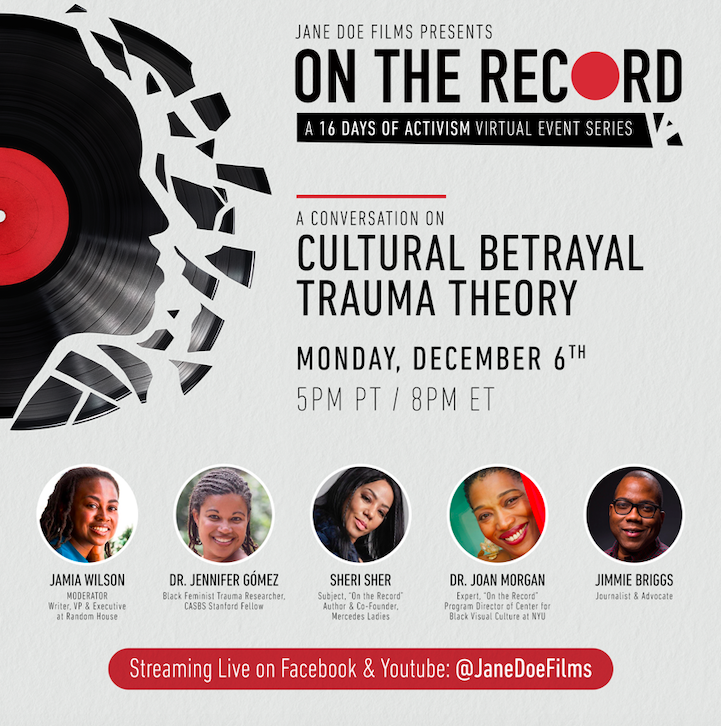
On The Record presents the powerful and haunting story of music executive Drew Dixon as she grapples with her decision to become one of the first women of color, in the wake of #MeToo, to come forward and publicly name hip-hop mogul Russell Simmons of sexual assault. The documentary chronicles not only Dixon’s story but that of several other accusers – Sil Lai Abrams and Sheri Sher. Directed and produced by Kirby Dick and Amy Ziering (The Hunting Ground, The Invisible War).
Trailer of the On The Record documentary:
The panel, On The Record: A Conversation on Cultural Betrayal Trauma Theory, framed around my research with cultural betrayal trauma theory is:
Jamia Wilson (Moderator): Author and Vice President and Executive Editor at Random House; Dr. Jennifer M. Gómez (at time of filming): Assistant Professor at Wayne State University, Fellow at the Center for Advanced Study in the Behavioral Sciences (CASBS) at Stanford University, Chair of the Research Advisory Committee at the Center for Institutional Courage, and incoming faculty at the School of Social Work at Boston University (Summer 2022); Sheri Sher: Author and American hip hop pioneer, best known as a founding member of the first all-female hip hop group, Mercedes Ladies; Dr. Joan Morgan: Writer and Program Director for the Center for Black Visual Culture at New York University (NYU); Jimmie Briggs: Writer, journalist, and justice advocate
December 2021
Inside Higher Ed
From Elizabeth Redden’s article in Inside Higher Ed, Researching ‘Institutional Courage.’
Jennifer M. Gómez, a board member and chair of the Center for Institutional Courage’s Research Advisory Committee and a fellow at Stanford University’s Center for Advanced Study in the Behavioral Sciences, said many of the research projects center on issues of structural inequality.
“The work that these phenomenal researchers are doing is hard to get funded, because it’s touching on issues like sexual violence—things that people don’t want to acknowledge exist—and additionally marginalization and oppression. People don’t want to admit that racism exists or that it exists within the fabric of American society, within the fabric of our institutions, and that institutions themselves can be doing harmful things and institutions that we need have problems with perpetrating harm,” said Gómez, who is on leave from her assistant professorship at Wayne State University.
November 2021
NBC News
From Mary Retta’s article in NBC News, Derek Chauvin Trial Is Another Media Spectacle That Causes Trauma Rather Than Healing.
This record is why some experts, such as Wayne State University professor and trauma researcher Jennifer Gomez, see the trial process as creating distress that can be better addressed elsewhere.
“Regardless of what happens in the court case, radical healing within the Black community is still possible,” she told me. “Radical healing — as something that is not predicated on what police or courts do — is something that Black people, as individuals and a community, can give themselves and each other.”
Gomez is referring to a framework put forth by the Psychology of Radical Healing Collective, which argues that through practices like intergenerational storytelling and advocacy work, we can address the root causes of racial trauma and promote resilience and better emotional well-being.
April 2021
Michigan Opera Theatre at Home
In Conversation: “Arts & Healing: Part 2“: Continuation of Part 1 (see below)- In living through times of crisis globally and personally, the arts offer opportunities for connection, catharsis, wellness, and healing.
A conversation with Michigan Opera Theatre’s Director of Education, Andrea Scobie, researchers/professors Dr. Jennifer M. Gómez, Dr. Jessica Lopez Lyman, Dr. Sara A. Ramirez, and world renowned ballet dancer, Brooklyn Mack.
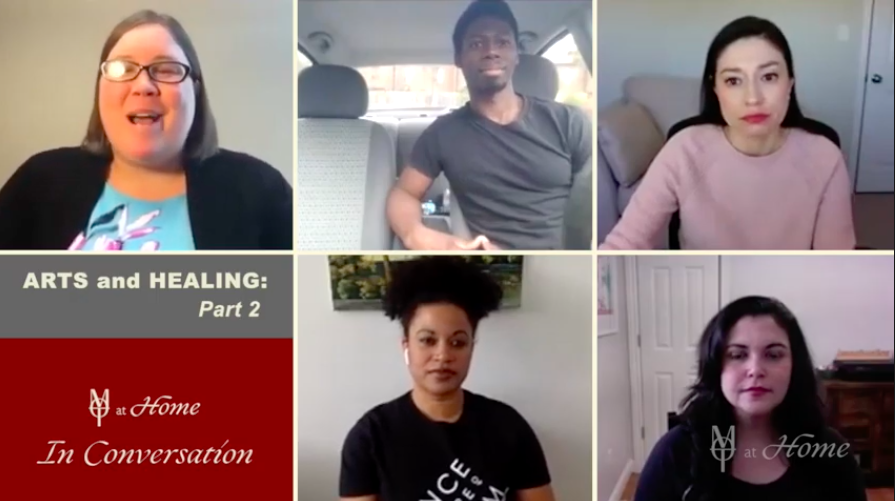
“From a trauma perspective and thinking about sexual violence…rape…our bodies are taken over, taken away, so the thought about having to be fully in your body…is very vulnerable and also has taught us that it’s dangerous…like ‘when you’re in your body, bad stuff happens’….So, re-learning, re-healing…at your own pace, your own time, not forcing yourself, not perpetrating against yourself, but trusting that vulnerability and how beautiful it can be to really be in your body, and having the arts as a way to heal…mind, body, soul, and spirit. Especially from things that have taken over our bodies and minds and souls and spirits through violence.”—Dr. Jennifer M. Gómez
March 2021
Michigan Opera Theatre at Home
In Conversation: “Arts & Healing: Part 1“: In living through times of crisis globally and personally, the arts offer opportunities for connection, catharsis, wellness, and healing.
A conversation with Michigan Opera Theatre’s Director of Education, Andrea Scobie, researchers/professors Dr. Jennifer M. Gómez, Dr. Jessica Lopez Lyman, Dr. Sara A. Ramirez, and world renowned ballet dancer, Brooklyn Mack.
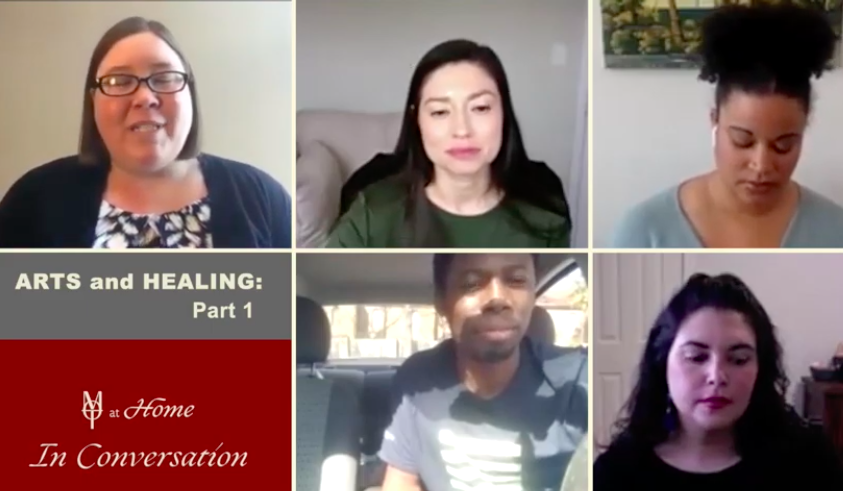
“Trauma and harm….like racism, is long lasting, sexual abuse happens over and over and over again for so long…Examples {for healing} are ballets…like Spartacus…with Carlos Acosta {who is Afro-Cuban} performing it…in Bolshoi {Ballet}….An opening scene where he’s just been imprisoned and just has the shackles on him. And he is coming to the realization of what it means to be enslaved and oppressed, and it’s so unnatural to be oppressed. I’ve shown that in many classes when I talk about what is racism. It’s this. It’s this confusion, it’s unfair…..I think of the same in a ballet like Manon where the title character, who I saw, it was played by Tamara Rojo out of Royal Ballet years ago…..the vast sexualization and sexism that she experienced from lots of people, including her brother, who used her…..Ballets like this, ballets like South African Suite from Dance Theatre of Harlem’s rep….I feel more human as I watch and re-watch these ballets, and {I} see a reflection of life for what it is, as well as a reflection of hope for what life could be.”–Dr. Jennifer M. Gómez
March 2021
Detroit Free Press
From Alia E. Dastagir’s article in the Detroit Free Press, Some People Don’t Believe Meghan Was Suicidal. Why That’s So Dangerous.
“Trauma is hard to grapple with,” said Jennifer Gómez, a psychology professor at Wayne State University. “It is difficult to hold in our minds that we live in a world depraved enough for rape and violence to be as common as it is. It can be easier to deny that reality – perhaps especially for people who are less likely to experience such traumas, such as white, straight, rich, cis men.”
March 2021
USA Today
Interviewed for Alia E. Dastagir’s article in USA Today, Andrew Cuomo and The Spectrum of Sexual Abuse: Why These Accusations Matter.
“For the allegations with Cuomo, it can be tempting to think, ‘Well, it’s just a couple of comments. Can’t she take it? Can’t she handle it?’ Part of that defensiveness can come from the culture just being that bad that many men have probably done this. And some women too, and it’s hard to see ourselves in that light,” said Jennifer Gómez, a psychology professor at Wayne State University. “We’ve all probably witnessed this happen … and so it’s hard for us to accept that we’ve either done the harm or been a witness to harm, and to grapple with what that means for ourselves as perpetrators, as victims, as bystanders.”
Gómez said research shows sexual harassment that’s ongoing can have mental health impacts just as severe as a discrete and more violent form of sexual violence such as rape.
Gómez said some of Cuomo’s behavior can be understood in the context of microaggressions – the persistent, subtle blows that affect marginalized groups, which public health experts say can affect long-term health and contribute to higher rates of mortality and depression.
“It’s the accumulation of these things that are really harmful, that are really testing,” Gómez said.
Equal access to opportunity, she said, isn’t just about getting your foot in the door. It’s about what happens when you’re inside.
“We have to examine our colleagues, our coworkers, ourselves,” Gómez said. “As long as we deny the existence of these behaviors, or in this case, the impact of them … we aren’t doing anything to make the world a fairer place.”
March 2021
We, As Ourselves
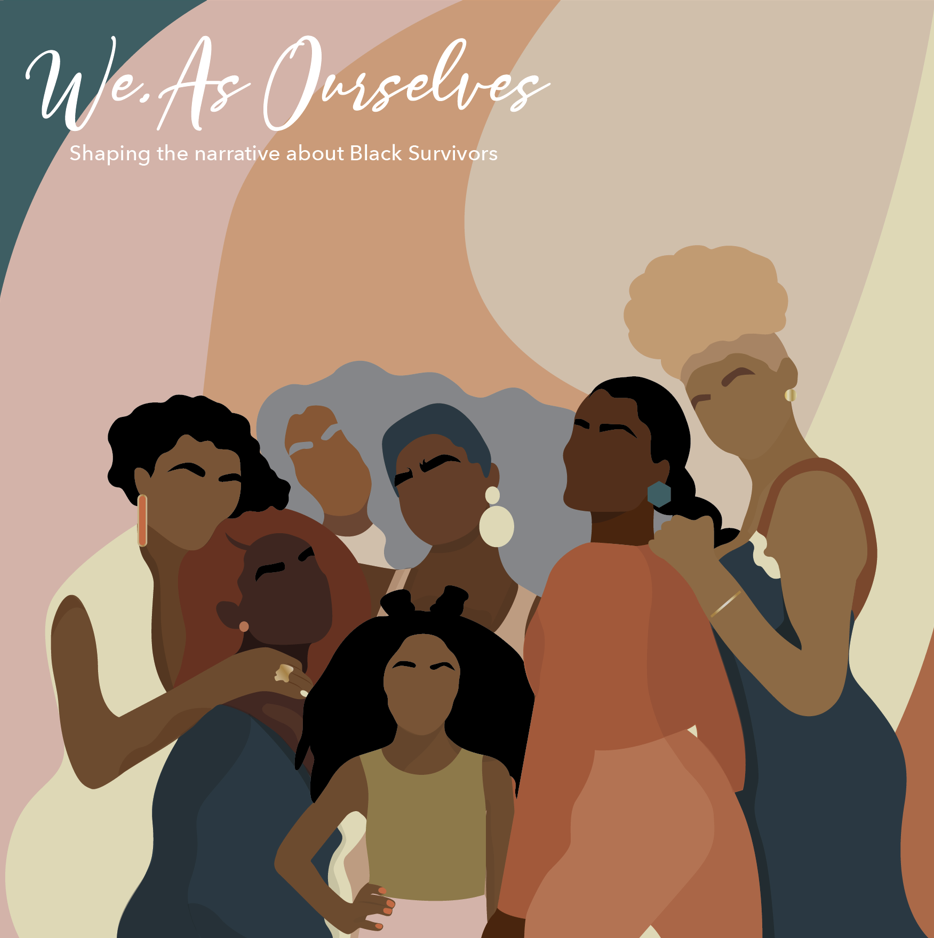
We, As Ourselves is a collaborative campaign led by ‘me too.’ International, National Women’s Law Center, and TIME’SUP Foundation to change the conversation about sexual violence and its impact on Black communities. The organizations are working together to create spaces where Black survivors can safely share their stories and experiences, upend behaviors and cultural narratives that harm and silence Black survivors, and build new practices where Black survivors are believed, heard, and supported.
It’s time to get real about the cycle of stereotypical, biased, racist, and sexist narratives that perpetuate violence in Black communities, and for more of us to engage in new models of care, consent, and accountability. We believe that we can end sexual violence in the Black community by openly addressing the harms inflicted upon women, girls, gender nonconforming and trans survivors.
Watch A Love Letter to Black Survivors, a 2-minute video to show love for those who have been shut out, silenced, and scrutinized. Our letter is a recommitment to supporting survivors, and an invitation to our communities to do the same. Featuring:
Lila Bernard (visual artist), Tarana Burke (activist/founder of the MeToo Movement), Dr. Kali D. Cyrus (psychiatrist/strategist), Dr. Robyn L. Gobin (clinical psychologist/researcher/professor), Dr. Jennifer M. Gómez (trauma psychologist/researcher/professor), Fatima Goss Graves (President/CEO National Women’s Law Center), Tamron Hall (journalist/talk show host), Michelle Hurd (actress), Valerie Jarrett (Senior Advisor to former U.S. President Obama), Alexia Norton Jones (activist), Barbara Lee (Congressperson), Dayna Lynne North (TV executive producer), Agunda Okeyo (writer/filmmaker/activist), Ashlee Marie Preston (journalist/activist/editor-in-chief), Leslie Silva (actress), Jurnee Smollett (actress), Crystal Dunn Soubrier (professional soccer player), Salamishah Tillet (feminist activist/scholar/writer), Scheherazade Tillet (visual artist), & Gabrielle Union-Wade (actress).
Take the pledge! #WeAsOurselves #metoo #TIMESUP #NWLC
February 2021
Michigan Opera Theatre (MOT) at Home
In Conversation: “Passage”: A new ballet from Dance Theatre of Harlem that is a moving reflection on the fortitude of the human spirit, created in recognition of the 400th anniversary of the arrival of enslaved Africans to Virginia in 1619.
A conversation with Passage choreographer, Claudia Schreier and composer, Jessie Montgomery, with moderator Jennifer M Gómez, Ph.D.
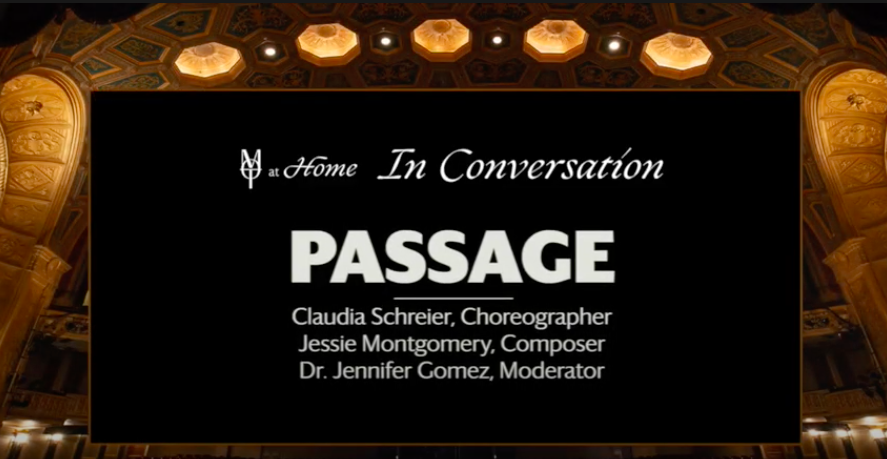
“What he {Arthur Mitchell} would always tell us was ‘We carry a mantle greater than ourselves’….This isn’t about me as an individual, this is about all of us….It is kind of hopeful to think that the things that we do and the things we are fighting for can live beyond us. And the people coming up behind us can carry the torch.”–Dr. Jennifer M Gómez
February 2021
The Lily, Washington Post
Interviewed for Julianne McShane’s article in The Lily, a product of the Washington Post, In Alexandria Ocasio-Cortez, These Survivors Found A Voice: ‘I Felt With Her The Deeply Vulnerable Pain of Telling Someone’.
By drawing parallels between her experiences as a survivor of both sexual assault and the attempted insurrection, Ocasio-Cortez also distilled the essence of what constitutes abuse, said Jennifer Gómez, a trauma psychologist and assistant professor at Wayne State University.
“If you’re thinking about what is trauma, what makes certain events traumatic, it’s having this power over people,” Gómez said. “In the [attempted] insurrection, the same thing is happening: Power is being taken away, as AOC is saying, in a disproportionate and discriminatory manner.”
And for survivors who have a “negative disclosure” experience — with someone who denies their experience — it’s crucial that they try not to internalize it, Gómez added.
“Another person’s negative response is not your fault — that’s an important one to remember,” she said.
Gómez added that survivors who have not yet shared their stories could start by journaling: “You don’t have to worry if the response is going to be negative, and you get to have some of the healing mechanisms of sharing.”
When it comes to deciding to share stories with other people, survivors may also opt to “sprinkle in smaller disclosures” before revealing their own experiences to determine if they can trust who they’re thinking of opening up to.
As Gómez put it: “Don’t give the full big doozy if you’re not sure — maybe tell a story about Tarana Burke, the founder of #MeToo, giving a talk about what she experienced, and see how that person responds.”
For those on the other side of the equation — the people survivors come to with their stories — both Gómez and Cook pointed to guidelines for “compassionate listening”compiled by Jennifer Freyd, a psychology professor at the University of Oregon. These guidelines recommend that listeners make consistent eye contact with survivors, don’t change the subject and don’t pass judgment, among other measures.
February 2021
USA Today
Interviewed for Alia E. Dastagir’s article in USA Today, Alexandria Ocasio-Cortez, Trauma, & Why Survivors Can’t Just ‘Move On’.
“(Sexual assault) is a violation that takes their power away … The insurrection also is very deliberately and explicitly taking power away, with harm directed at specific targets, like women of color, more than others, like white men,” said Jennifer Gómez, a psychology professor at Wayne State University. “AOC, and all the many others who have experienced violence, is reacting normally to extreme events. The links between sexual assault and the insurrection, in particular, are profound.”
“Abusers demand silence,” Gómez said. “The trouble is such a silence mandate is crazy-making for people who experience the violence and who see the world for what it is: a place that includes such violence just as much as it includes joy.”
February 2021
Forbes Magazine
Interviewed for Jessica Gold’s article in Forbes Magazine, 8 Things Mental Health Experts Want You To Know On World Mental Health Day.
“According to Dr. Jennifer M. Gómez, Assistant Professor in the Department of Psychology and Merrill Palmer Skillman Institute for Child & Family Development (MPSI) at Wayne State University, having good mental health does not mean you are happy all of the time. She pointed out that a wide range of emotions from sadness to anger to grief are “integral parts to being alive.” Listing many triggers in our environment including Covid-19 and police violence, Dr. Gómez noted that reacting happily after experiencing any of those things directly or indirectly would be abnormal. She added, ‘If you’re struggling, there’s nothing inherently wrong with you.’”
October 2020
Count 9 Podcast: From Ballerina to Professor
Interviewed by Ben Goodly for his Count 9 podcast regarding the career transition from professional ballet dancer with Dance Theatre of Harlem to the academic career as an academic: assistant professor, Black feminist trauma researcher, teacher, and mentor.
What I learned “…direct from Mr. {Arthur} Mitchell: buck against the system. Of just you cannot, cannot wait for things to be equal enough and for oppression to be eradicated. And wait for me to walk in the room as a Black woman and have people assume I’m a professor before I get up to speak. I cannot wait for those things to happen. I have to just do it anyways. And I think it’s the biggest lesson from him and then from what he’s done with Dance Theatre of Harlem, that you just do it anyways. And when you’re doing it anyways, change is happening. Things do become more equal by your presence of just kind of pretending that you belong and that people want you here. Even when you’re not sure that’s true, because of racism or sexism.”–Dr. Jennifer M. Gómez
September 2020
NBC News
Interviewed for Danielle Campoamor’s article in NBC News, Coronavirus Catcalling Is Real. Mask or No Mask, Harassment Is All About Power:
“’Street harassment, like all forms of sexual and gender violence, are fundamentally about power and reinforcing inequality,’ Dr. Jennifer M. Gómez, a trauma psychologist and assistant professor in psychology at Wayne State University, said. ‘Sexualizing a woman or girl in public through street harassment reduces her to an object for others’ consumption. Meaning, she is stripped of her full humanity and instead reduced to simply a physical or sexual thing whose purpose is men’s pleasure.’”
July 2020
Shape Magazine
Interviewed for Mallory Creveling’s article in Shape Magazine, How to Tap Into Your 5 Senses to Find Peace and Be Present:
“‘[Grounding techniques] help to remind you physically and physiologically of where you are,’ says Jennifer M. Gómez, Ph.D., assistant professor in the department of psychology and Merrill Palmer Skillman Institute for Child & Family Development at Wayne State University. ‘It’s like a release—a switch to turn off the light on all the stress and to be in a place of less chatter and anxiety.’…Gómez and Exelbert both say those who’ve experienced trauma, such as sexual assault or police violence or aggression, may benefit most from this grounding technique. That’s why it could be especially helpful right now, for anyone who’s witnessing police brutality and biases in real-time on TV, and it’s causing them to re-live a past experience. ‘There can be times where you have flashbacks, a sort of movie re-playing in your head of the same event, so even though the event stopped, you might re-experience it like it’s new,’ explains Gómez. ‘Thinking about what you’re seeing, hearing, or smelling gets you into the present,’ and out of the re-play.”
July 2020
HuffPost
Interviewed for Jenna Birch’s article in Huffington Post, What Not To Stay To Someone Who Has Experienced Racial Trauma:
“You can think of racial trauma as the psychological and physical impacts of racism, both interpersonal and structural, according to Jennifer M. Gómez, assistant professor of psychology at Wayne State University and a faculty member at the university’s Merrill Palmer Skillman Institute for Child & Family Development. Acts that can trigger racial trauma range from slurs and open discrimination to health care disparities and police profiling, Gómez said. Racial trauma has ‘similar outcomes to domestic violence, like depression, anxiety, hypervigilance, PTSD, insomnia, physical health problems, the gamut,’ she explained.”
July 2020
Forbes Magazine
Interviewed for Jessica Gold’s article in Forbes Magazine, Feeling Anxious About Wearing A Mask? Here Are 5 Ways To Overcome It:
“Dr. Gómez says for some people with a history of trauma, like sexual abuse in childhood or domestic violence, wearing a mask may remind them of the trauma. For example, for someone who during a sexual assault was unable to breathe because the perpetrator was covering their mouth and nose, when they put on a mask, it can bring up that same fear and fright, even if they are not consciously thinking about their sexual assault. According to Dr. Gómez, ‘the body remembers such traumas implicitly. So, again, your body is overreacting because it thinks you’re unsafe and it wants you to do something about it.’ Your body is simply protecting you…Dr. Gómez adds ‘being uncomfortable, scared, or triggered is nothing to be ashamed of. All we can ask for from ourselves is to try our best. And you, your safety, and the safety of others is worth your trying and re-trying to teach your body that the mask is safe to wear.’”
July 2020
Newsweek
Interviewed for Joan Cook’s article in Newsweek, The Black Lives Matter Protests Are Running on Much More Than Anger:
“The tragedies that we’re witnessing are neither new nor isolated. And, of note, they haven’t stopped, even though videos have made it possible for the world to be watching and condemning the government-sanctioned violence against black people in the U.S. The difference is this moral elevation, this action-oriented hope, that has resulted in so many of us coming together to fight for justice. And, at long last, for some of us to finally listen and bear witness to the anti-black hate and violence that so many of us for so many years have been sharing without being believed…What should be completely depressing engenders action-oriented hope…When truth of depravity is finally acknowledged, we discover avenues for enacting change on large and small scales. Witnessing those actions in ourselves and others gives us this moral elevation that makes life worthier of living.”
June 2020
Forbes Magazine
Interviewed for Jessica Gold’s article in Forbes Magazine, How To Protect Your Mental Health Even While Watching The News:
“Dr. Gómez notes that while we generally ‘need’ to be informed, we do not ‘need’ to have our sleep interrupted, to watch videos of violence and murder, or to only know of the bad things that are happening in the world. In fact, she believes we watch and keep watching, in some way looking for hope or positive news, especially currently. She adds, ‘the need for hope is perhaps stronger than any other need we think we have for staying informed.’”
June 2020
InStyle Magazine
Interviewed for Kylie Gilbert’s and Alexandra Whittaker’s article in InStyle Magazine, How To Tell Your Boss You Need A Mental Health Day:
“Today, we again find ourselves living in a similar time of high-profile agony, from the million cuts of a work colleague remarking, in disbelief, that, as a Black person, you speak so well, to Black people getting beaten and killed in the streets and their homes with impunity…Though these realities are even older than the United States of America itself, the weight of the injustices, including deaths, can reach a level so toxic that taking care of our souls, spirits, psyches, minds, and bodies must take priority…We can fit a mental health day into a…piece that works for us.”–Dr. Jennifer M. Gómez
June 2020
InStyle Magazine
Interviewed for Kylie Gilbert’s article in InStyle Magazine, How To Check In On Your Black Friends & Coworkers:
“The onslaught of media and videos showing threats, beatings, and murders can be overwhelmingly painful. Because racist violence is not new, some Black people have learned how to cover up their ongoing fears, stress, and mental health problems related to racism…Reaching out is about opening a door of communication. It is up to the other person if, when, and how they’d like to go through that door with you…Remember: racism divides us. Humble, genuine solidarity can reunite us.”–Dr. Jennifer M. Gómez
June 2020
CNN Business
Dr. Jennifer M. Gómez was interviewed by Julia Carpenter for her CNN Business article, Serena Williams’ Nike ad exposes the double standards women face at work.
“Women in the workplace are tasked with the additional work of managing these perceptions, Gómez says.
“So much time is spent worrying adapting your speech and figuring out what to say and how you can say it differently and that is taking away from time and energy and effort for your job,” she says. “It’s a job for you to figure out ‘how can I say this in this meeting without people painting me in this emotion corner?’ and I think the trap with that is that it’s not in the woman’s control.”
25 February 2019
CNN Business
Dr. Jennifer M. Gómez was interviewed by Julia Carpenter for her CNN Business article, Minority employees are often asked to work double-duty.
This “double shift” is common in many workplaces. White, cisgender or straight colleagues may be fearful of accidentally saying the wrong thing. So instead, they task employees of different races, backgrounds or sexual orientations with the “diversity work” that otherwise wouldn’t get done.
“I don’t think people realize how much emotional time it takes and how much physical time it takes,” says Jennifer Gómez, . . . Wayne State University. “I believe that oftentimes it’s seen as ‘It’s not my issue. I’m a white person. Racism isn’t my issue. It’s not about me. It’s about those people over there.’ and really, diversity and equity is everyone’s responsibility.”
November 2018
CNN Money
Dr. Jennifer M. Gómez was interviewed by Julia Carpenter for her CNN Money article, The ‘Emotional Tax’ Afflicting Women of Color at Work.
This is where offices and managers can step in to lift the burden, experts say. The first step is focusing on retention as well as recruitment.
“Don’t just focus on getting people here, but listening when they are here,” Gómez says. “Sometimes in the workplace it can be ‘OK, we have two women of color on staff, they’re gonna be in charge of the diversity committee and they’re gonna fix it.’ If we want to make this workplace one that isn’t rife with racism, sexism, and sexual harassment, then it’s all of our jobs.”
March 2018
WAYNE STATE UNIVERSITY (2017-22)
Wayne State University Today@Wayne
Featured in Wayne State University Today@Wayne Newsletter: Merrill Palmer Skillman Faculty Member Wins Stanford University Fellowship.
“Gómez is a nationally and internationally known expert on the impact of violence on Black and other marginalized youth and young adults through her research with Cultural Betrayal Trauma Theory. Candidates propose a research project to complete during their Stanford residency. Gómez will synthesize her research by writing an academic book with the working title, Cultural Betrayal, Sexual Abuse, & Healing for Black Women & Girls: From Black Lives Matter to MeToo. It’s a project, she said, ‘I’ve had on my mind for years,’ and she has signed with American Psychological Association (APA) Books for publication. Gómez recently won the APA Carolyn Payton Early Career Award for her article, ‘Black Women and Girls & #MeToo: Rape, Cultural Betrayal, & Healing,‘ which serves as the book’s theoretical foundation.”
May 2021
Wayne State University Graduate School Newsletter
Featured in Wayne State University Graduate School Newsletter,Professor Studies Unique Harm of Cultural Betrayal.
“‘Interpersonal violence, including child sexual abuse, bullying, domestic violence, and rape, happen to and around kids, at points in their lives that are fundamental to shaping who they are, who they will become, and what they believe the world to be,’ Gómez said, a trauma psychologist and assistant professor in the Department of Psychology and the Merrill Palmer Skillman Institute for Child & Family Development (MPSI). ‘On a societal level, the protection of children and adolescents is lacking, as evidenced by the U.S.’ refusal to ratify the United Nations Convention on the Rights of the Child (UNCRC).” The U.S. is the only member state of the United Nations that has not ratified the treaty.’”
December 2020
Wayne State University Graduate School article
“Being a PFT fellow is truly a dream job for me as a junior researcher who wants to make my career at Wayne State,” says Gómez. The Ford Foundation Postdoctoral Fellowship will support her work in developing and validating a culturally sensitive measure of CBTT on black emergent adults. “Known as the Cultural Betrayal Multidimensional Inventory,” she explains, “this measure will engender needed research on mental health and personal growth in black people who experience both violence and discrimination.”
March 2018
Wayne State University Spotlight
Featured in the Wayne State University Spotlight on Postdoctoral Scholar Series for Cultural Betrayal Trauma Theory
December 2017
Imprints
Work featured in article, “New Trauma Theory Examines Cultural Betrayal” in the Wayne State University Merrill Palmer Skillman Institute newsletter, Imprints.
“Dr. Jennifer M. Gómez, MPSI’s new post-doctoral fellow, has revealed yet another critical factor: cultural betrayal. . . ‘If a Black woman is raped by a Black man, the racial loyalty is also disrupted. A member of her ‘group’ has turned on her,’ Dr. Gómez said. These effects happen in ethnic minority groups, because years of racial oppression by ‘outsiders’ can foster deep loyalty between members. Members unite for support, validation and a sense of community. This circle of trust can be protective and secure. When within-group violence between members breaks this (intra)cultural trust, though, the effects of this cultural betrayal trauma can intensify. The victim may feel shunned by the group that used to protect her. She may have no safe haven, no one to trust.”
November 2017
You must be logged in to post a comment.